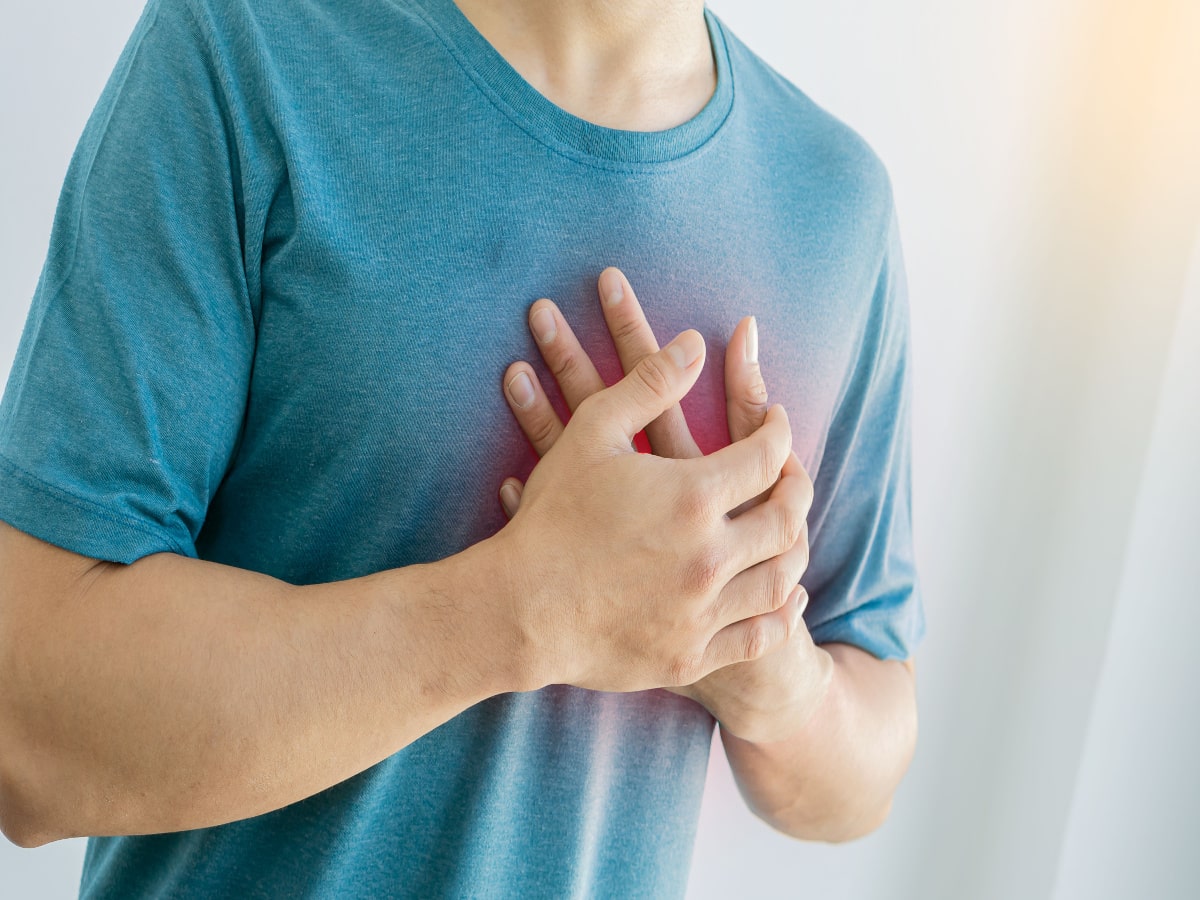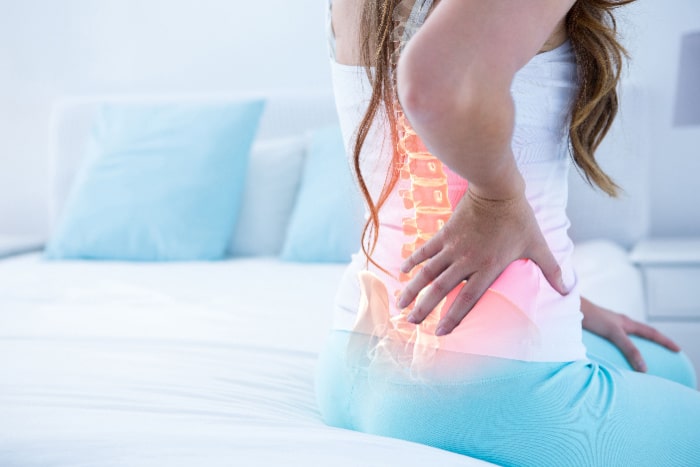
Introduction
IBS is a common long-term digestive health issue that impacts the digestive function of a significant percentage of the global population.
The symptoms of IBS include:
- Abdominal pain
- Bloating
- Alternations in bowel movements (constipation or diarrhoea) [Source: PubMed]
In addition to these typical symptoms of IBS, further symptoms may be present. These can include:
- Headaches and migraines [Source: PubMed]
- Skin issues [Source: PubMed]
- Heartburn and chest pain [Source: PubMed]
Even though chest pain is not a symptom required for diagnosing IBS, it may be a symptom many of those with IBS experience. However, there can also be other causes of check pain that it is important to be aware of.
Can IBS cause mild chest pain?
You may be experiencing mild chest pain with your IBS symptoms. This can happen when you have bloating or if the pain is caused by stress or anxiety.
Chest pain can also occur as a result of indigestion or heartburn, which can be the result of alternated levels of stomach acid, increased gas production in the gut as well as the increased sensitivity of the nerves in the oesophagus. [Source: PubMed, PubMed]
It’s also possible for the contents of the stomach to regurgitate, leading to chest pain. This is where stomach contents back into the oesophagus due to a relaxed lower oesophagal sphincter (LOS), which separates the upper from the lower part of the digestive tract. [Source: PubMed]
Can IBS feel like heart pain?
There are many similarities between IBS and heartburn and an overlap in the possible underlying causes, such as imbalances in the gut microbiome and SIBO. [Source: PubMed, PubMed]
Even though the symptoms of IBS are primarily located in the abdomen (which indicates the small or large intestines), heartburn symptoms and chest pain are in the upper chest.
However, if the IBS imbalances are triggering more gas production, this can place pressure on the diaphragm, leading to pain in the chest region.
This may also trigger heartburn via the acid reflux that occurs when stomach acids back up into your oesophagus (the tube connecting your mouth and throat). [Source: PubMed]
Can IBS cause chest and rib pain?
Yes, it can. IBS is a common cause of chest pain because of the spasms and cramping of the stomach muscles.
Chest and rib pain can also be caused by heartburn, which happens when stomach acid backs up into your oesophagus (the tube that connects your mouth to your stomach).
The rib pain may be due to cramping underneath the ribs in part of the digestive tract. It’s also possible for this to be referred pain. This is where pain in one area of the body triggers the nerve in another area of the body.
It’s also possible for lots of gas produced in one part of the gut to press on a nerve, triggering pain under the ribs or in the chest. [Source: PubMed]
Do you get pain under your ribs with IBS?
It is common for people with IBS to experience pain under their ribs. This can be caused by a variety of factors, including:
- Heartburn and reflux (GERD)
- Muscle spasms in your abdomen or chest wall
- Anxiety [Source: PubMed]
With any symptom of IBS that occurs, there can often be ways to reduce the symptom via symptom management strategies. It is also important to consider the underlying issues.
Can bowel problems cause pain under the ribs?
It’s possible for IBS pain and discomfort to be felt under the ribs. This may be due to bloating, gas, or even heartburn. The pain is usually mild and not serious.
If the abdominal discomfort is severe and accompanied by chest pain that lasts more than an hour or so, it may then be appropriate to seek medical attention.
For milder symptoms, certain approaches can be considered to try and reduce the pain.
These include:
- A low FODMAP diet [Source: PubMed]
- Probiotic supplements [Source: PubMed]
- Simethicone [Source: PubMed]
- Charcoal capsules [Source: PubMed]
Why do my chest, stomach, and ribs hurt?
Chest pain is often a sign of an underlying health condition. If you have IBS and are experiencing chest, stomach, and rib pain, it could be due to gastroesophageal reflux disease (GERD), heartburn, or indigestion. [Source: PubMed]
If your chest discomfort is severe enough that it keeps you from doing the things you want to do or makes it difficult for you to sleep at night, see your doctor.
Can IBS cause back and rib pain?
 IBS can cause back pain and rib pain. If your IBS symptoms include abdominal pain, cramping, bloating, or diarrhoea, then these are all signs of IBS.
IBS can cause back pain and rib pain. If your IBS symptoms include abdominal pain, cramping, bloating, or diarrhoea, then these are all signs of IBS.
IBS also causes constipation in some. This means that the impaction in the bowel can increase pressure on the gut wall, triggering pain.
The increased gas produced in the guts of many people with IBS can place pressure on nerves in the abdomen. This may then trigger sensations of pain in the back and the ribs. [Source: PubMed]
Many of those with IBS also experience fibromyalgia, a chronic pain syndrome. This indicated a generally increased level of pain being experienced by those with IBS. [Source: PubMed]
Heartburn and chest pain
Heartburn is a burning sensation in the chest. It can also be described as a feeling of fullness in the chest or even like a heavy weight is on your chest. Heartburn can be caused by acid reflux, which occurs when stomach acids back up into your oesophagus and throat.
Some with heartburn feel like they may be having a heart attack. The main difference in how these feel can be that a heart attack feels closer to tightness or squeezing rather than pain. Heart attacks are also accompanied by pain radiating from the chest to other areas of the body, such as the jaw or arm. [Source: PubMed]
How do I know if my chest pain is just heartburn?
If you have a burning sensation in the chest, it could be heartburn. Heartburn is caused by stomach acid refluxing back up into the oesophagus. The oesophagus is a tube that carries food from your mouth to your stomach.
When this happens, you may feel like something is stuck in your throat or like someone has lit a match in there–a sharp pain that usually occurs after eating or drinking something hot or acidic (such as coffee).
It is also possible for chest pain to be misdiagnosed as heartburn rather than a condition such as angina. [Source: PubMed]
Why does my chest hurt and feel like heartburn?
Chest pain is a symptom of many different conditions. Heartburn, also known as acid reflux, occurs when stomach acid backs up into the oesophagus. It can be caused by IBS and other digestive disorders, but it’s also common in people who don’t have any other symptoms of IBS or other digestive problems.
If you experience chest pain along with bloating and constipation (two more common symptoms that indicate an intestinal disorder), then further assessments may be considered to investigate the causes of the symptoms. [Source: PubMed]
What are the signs of an impending heart attack?
While chest pains can indicate an impending heart attack, it’s not always the only symptom present.
In fact, there are several signs that you should watch out for.
- Chest pain, which travels from left arm to neck
- Shortness of breath
- Sweating
- Nausea or vomiting
- Abnormal heartbeat
- Anxiety [Source: PubMed]
Pain in the chest or arm. This is one of the most common symptoms of a heart attack and can feel like pressure, fullness, or squeezing in the chest. It may radiate to the left shoulder and arm as well but could also be felt on its own without any other symptoms listed here (except for shortness of breath). [Source: PubMed]
How do you get rid of chest pain from IBS?
If IBS is the cause of the chest pain, working to address the underlying issues in the gut should be the main approach.
This can include key areas of focus to treat the issue. Well-understood approaches to target IBS issues can include diet, probiotics supplements, relaxation practices, as well as other types of supplements.
To calm the symptoms of IBS, a low FODMAP diet removed common foods that may increase gas or pain. This can be considered a short-term approach to reduce symptoms, while a long-term approach can be considered to be a Mediterranean-style diet. [Source: PubMed, PubMed]
Natural supplements such as probiotics have been well-researched and found to be helpful in addressing possible underlying causes of IBS symptoms. These can support the balance of the gut microbiome as well as reduce the sensitivity in the gut lining. [Source: PubMed]
Depending on the underlying cause of symptoms, further supplements can be considered. In situations where symptoms started after food poisoning, l-glutamine has been indicated to be an important therapy. [Source: PubMed]
Additionally, in cases of IBS where SIBO is the underlying issue, herbal antimicrobial herbs (such as garlic and oregano) have been found to help support the balance of the gut microbiome. [Source: PubMed]
Alterations in the gut-brain connection have been found to play a role in the development of IBS symptoms. Studies into gut-brain support in the form of mindfulness practices and gut-directed hypnotherapy have both been found to help reduce symptoms of IBS. [Source: PubMed, PubMed]
Conclusion
IBS can cause chest pain and other digestive symptoms, but it’s important to know that not all chest pains are caused by IBS.
However, in cases where symptoms are caused by imbalances in the gut, there are many ways to identify and address the underlying issue.






